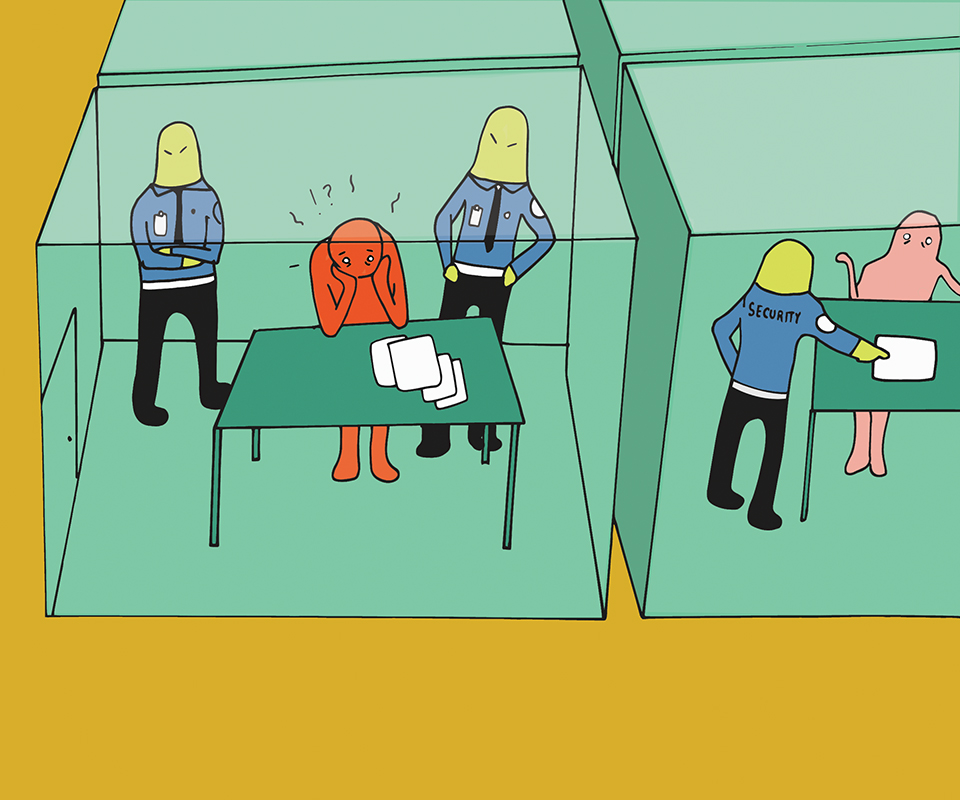French student Nolwenn Bouillé does “le tour du poteau.”
Nolwenn Bouillé was excited to start her first year at Concordia. But first she had to do “Le tour du poteau.”
The purpose of “Le tour du poteau” (“Flagpoling”) is to change one’s visa status. However, in order to do so, a person must leave and re-enter the country. Bouillé did this by taking a bus to the New York border, then crossing back into Canada moments later.
This wasn’t the first obstacle she had encountered when coming to study in Canada. While living in Hong Kong, Bouillé, a French citizen, decided that rather than go back to France for university, she would study in Montreal. She wanted to see other countries and practice her English while maintaining the security of being in a French-speaking city. She chose Concordia for its film studies programs, since she wanted to minor in it, and chose to major in political science.
She started filling out all the documents needed to come to Canada and study in Quebec. Bouillé said everything was going well until she started applying for her study permit. “The study permit was a problem because at first they told us we didn’t need a medical check-up,” said Bouillé.
However, a week before leaving for Montreal, Immigration Canada emailed her saying she would need to have a blood test, chest x-ray and a general check-up as part of the application process. She was provided names of doctors and was told the tests could only be done by someone on the list. “We eventually found someone who could do all that a week before leaving,” said Bouillé. She sent in her information and came to Montreal with all her documents.
Bouillé said there was never any clear reason given as to why Canada required a full medical exam as part of the application process.
“When we arrived at immigration, we were waiting for about an hour at the first desk,” said Bouillé. She was then moved to a room with other international students. “We waited for a long time, probably about two hours. It was about midnight at this point.”
When she was called, she presented all the necessary documents to the immigration officer and expected to receive her study permit. “He told me basically that I shouldn’t have flown to Montreal at all.” This was because she had never received confirmation that the study permit had gone through. Bouillé said she was never aware that she needed the confirmation. “I just knew that when you arrive at the airport, you’re supposed to go to a desk and they have the documents and they give you the study permit.”
Bouillé was sent to another waiting room to have her case looked at again. There, she met with another Canadian immigration agent. “This woman told me that she had two options: she could either send me back home directly on the next flight or she could give me a tourist visa for 11 days.”
Bouillé was told if she got the tourist visa, that once her study permit was confirmed she would have to do “Le Tour du Poteau.” “I think she was trying to scare us somehow, she was like ‘I don’t know, I don’t know’ but she finally gave [me] the opportunity to get the tourist visa,” she said.
The agent also told her that because she didn’t have the study permit, she wouldn’t be allowed to attend her classes. “That kind of stressed me out because I didn’t want to lose a week,” Bouillé said.
Once she obtained the tourist visa, Bouillé went to the International Student Office (ISO) at Concordia for help. She said the assistance she received in person was very helpful.
Bouillé said that although the ISO was helpful when she met with the advisor in person, they were never involved in the initial application process. “They just give you a list [of documents] and you have to do it yourself,” she said. “It was difficult at first because you have to get through all those immigration websites and they tell you different things.”
A week later, Bouillé got the study permit confirmation. She completed “Le Tour du Poteau” by crossing the New York border, then walking across the street back into Canada. Once on the Canadian side, her official study permit was processed and issued and she returned to Montreal.
In an email to The Concordian, university spokesperson Mary-Jo Barr offered tips to new students coming from abroad. “Students should read the Pre-Departure Guide,” she said. “They should ensure they have all of their documents with them when they travel, including their Letter of Introduction.” Barr said students should attend a Pre-Arrival Webinar, where they can learn how to apply and what to bring when traveling. She suggested students contact the ISO for information and assistance. Barr said, “students who arrive through Trudeau Airport can also request Accueil Plus – to have their study permits prepared ahead of their arrival.”
Bouillé said the ISO could communicate better with international students. “With the time differences, it’s not easy to get someone on the phone and emails take time.” However, she didn’t fault the university for the struggle she faced in obtaining the study permit. “I don’t think they realize how difficult it is to apply when you’re in another country,” she said.
Bouillé hopes that by sharing her story, she will help other international students, as well as inform Canadian residents of the lengths that some people have to go to in order to obtain study permits and visas.
Graphic by @spooky_soda




